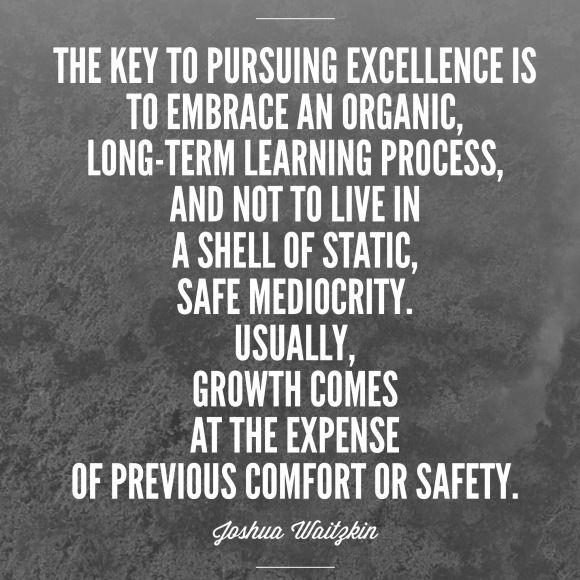A few weeks ago, needing a new podcast to work through, I started re-listening to the Tim Ferriss show from the first episode. Tim’s podcast is focused on what makes the best, brightest, and most accomplished tick, and gleaning insights on how they live their lives. Tonight I listened to his interview with Joshua Waitzkin, the subject of the film Searching for Bobby Fischer (free on prime streaming video), and author of The Art of Learning. As I try to do when listening to podcasts or reading books, I took notes. Here are some of the main points I found particularly interesting.
We begin with a question:
How do you go about building a daily architecture based on feeding a creative mind?
Some of the tangible methods mentioned in the podcast that I’ve been working to improve or cultivate in my own life:
Meditation (deepening creative process, improving health, a multitude of benefits) For Joshua, much of his meditation is combined with movement – particularly the practice of Tai Chi. Tim discussed his own easing into mediation by sitting for 5-10 minutes daily. I’ve dabbled with meditation over the years, and I’m still looking to cultivate a better meditation process. It’s something that I’m looking to actively build into a habit.
Turn mind to creative work pre-input. This is to say, journal (or write) in the morning before checking your email, RSS feed, Instagram, and email, again. This is one of my worst habits, partially because I charge my phone next to the bed. To change this habit, I will move the phone from reach before going to bed tonight, and put my journal next to my bed.
Ending the work day with quality. This is something I struggle with – it’s easy to find the day ending in a little bit of a lull after a caffeine crash. By ending the work day with quality, you allow yourself to internalize quality overnight. On Monday, I plan to schedule in an important task at the end of the day 30 minutes before I leave. (Note, these do not need to be tasks you finish – in fact, leaving something to write the next day was also mentioned as a productive strategy.)
Similarly, ending a workout with a focus on quality. This means making those last few minutes count. For me, this is kicking it to 200% and sprinting through the finish. Or pushing through those last few minutes of a ride. By ending a workout with a focus on quality, you internalize precision and a strong finish. I’ve worked hard to cultivate this knowing that it drives coaches nuts when you give up in the last few minutes of a workout. I’ve noticed that when I finish on a high point, I’m much more likely to want to head in the next day or two for another workout.
Journaling. Part of my journaling ends up here on the blog, but private writing is important to build and work through complex issues. I’ve been trying to focus on spending more time writing in a physical journal.
Post mortem processes – asking yourself what are the core areas of complexity you are challenged with? At work I lead agile retrospectives with our teams – this practice is actually quite helpful at home as well, and can be as simple as asking yourself a few questions about how things went, what worked well, what didn’t work so well, and what you can improve.
Finally, release your mind from work at the end of the day. I’ve always struggled with coming home with the intention of spending quality time with my family and friends, and the draw of unfinished work emails, or even the always tempting idea of “getting ahead of the work for the next day”. But shutting off is important, and something we all need to focus on.
Are any of these things that you’d like to focus and improve on?
Reading mentioned that I haven’t read but would like to:
Hemingway’s A Moveable Feast
Robert Pirsig’s Zen + The Art of Motorcycle Maintenance. (Which I own, but have not read. Putting the book on the nightstand tonight, and I will finish it before the end of the year.)
Learn more about Tim’s podcasts here.


